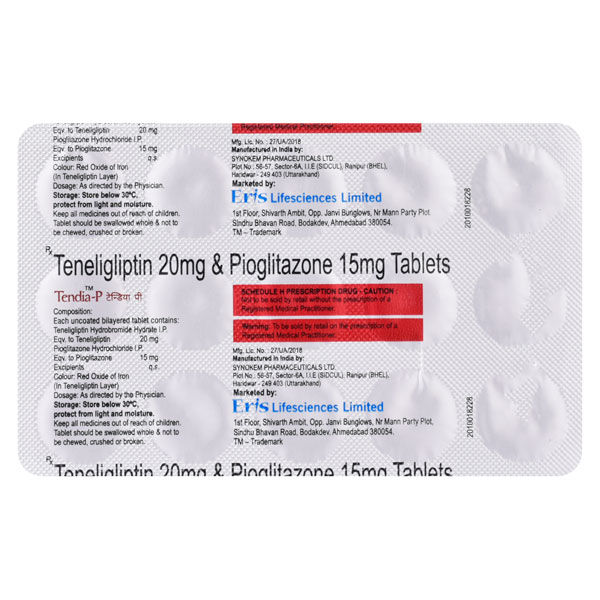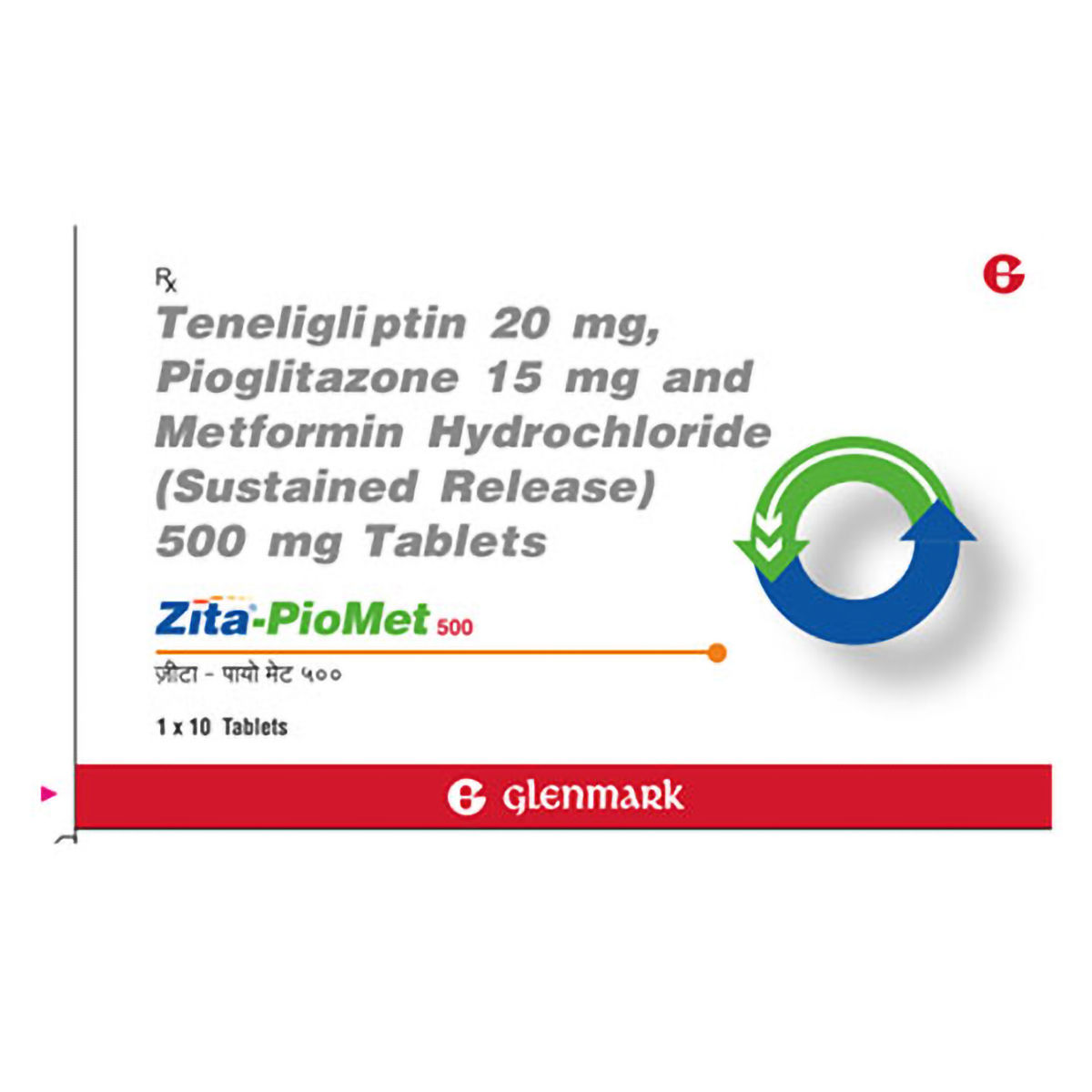Pioglitazone+teneligliptin
About Pioglitazone+teneligliptin
Pioglitazone+teneligliptin belongs to the group of anti-diabetic medicines used to treat type-2 diabetes mellitus. Type-2 diabetes mellitus is also known as non-insulin-dependent diabetes or adult-onset diabetes. It is a condition in which the blood glucose levels are above normal.
Pioglitazone+teneligliptin contains Pioglitazone and Teneligliptin. Pioglitazone increases the body’s sensitivity to insulin, and teneligliptin decreases the release of hormones that raise blood sugar levels and increases the release of insulin from the pancreas. Together, Pioglitazone+teneligliptin helps treat type-2 diabetes mellitus.
In some cases, Pioglitazone+teneligliptin may cause side effects such as headache, muscle pain, and vision problems. Most of these side effects do not require medical attention and will resolve gradually over time. However, you are advised to consult the doctor if any side effects persist or worsen.
Do not take Pioglitazone+teneligliptin if you are allergic to any of its components. Consult the doctor if you are pregnant or breast-feeding. Keep the doctor informed about your health condition and medications to rule out any unpleasant side effects/interactions.
Uses of Pioglitazone+teneligliptin
Medicinal Benefits
Pioglitazone+teneligliptin contains Pioglitazone (thiazolidinediones) and Teneligliptin (dipeptidyl peptidase 4 inhibitors). It is used to treat type-2 diabetes mellitus. Pioglitazone lowers blood sugar levels by restoring the proper insulin amount in the body. Teneligliptin decreases the release of glucagon, a hormone that raises blood sugar levels, and increases the release of insulin from the pancreas. Together, Pioglitazone+teneligliptin helps treat type-2 diabetes mellitus.
Directions for Use
Storage
Side Effects of Pioglitazone+teneligliptin
- Headache
- Muscle pain
- Vision problems
Drug Warnings
Do not take Pioglitazone+teneligliptin if you are allergic to any of its components. Inform the doctor if you have kidney or liver problems, heart failure, diabetic ketoacidosis, congestive heart failure, heart attack or stroke, eye problems, or bladder cancer. Consult the doctor if you are pregnant or breast-feeding. Let the doctor know if you take other medicines, including supplements and herbal products.
Drug Interactions
Drug-Drug Interactions: Inform the doctor if you are taking anti-diabetic (insulin), anticonvulsant (pregabalin) or hormone (levothyroxine).
Drug-Food Interactions: No interactions found/established.
Drug-Disease Interactions: Inform the doctor if you have diabetic ketoacidosis, type-1 diabetes, or heart problems.
Drug-Drug Interactions Checker List:
Safety Advice

Alcohol
consult your doctorIt is unknown if alcohol affects Pioglitazone+teneligliptin. Please consult the doctor.

Pregnancy
consult your doctorLimited information is available. Please consult the doctor if you are pregnant or planning for pregnancy.

Breast Feeding
consult your doctorLimited information is available. Please consult the doctor if you are breastfeeding.

Driving
consult your doctorIt is not known if Pioglitazone+teneligliptin affects your ability to drive. Therefore, drive or operate machinery only if you are alert.

Liver
consult your doctorLimited information is available. Please consult the doctor if you have a liver impairment or any concerns regarding this.

Kidney
consult your doctorLimited information is available. Please consult the doctor if you have kidney impairment or any concerns regarding this.

Children
consult your doctorLimited information is available. Please consult the doctor if you have any concerns regarding the usage of Pioglitazone+teneligliptin in children.
Habit Forming
Diet & Lifestyle Advise
- Include fruits, vegetables and whole grains in your diet.
- Try eating food at regular intervals. Do not skip meals. Also, try not to overeat.
- Maintain a healthy weight by exercising regularly.
- Rest properly. Avoid stress by doing meditation or yoga.
- Limit saturated and processed food.
- Stay physically active as it helps manage blood glucose levels.
- Avoid/limit the consumption of alcohol as it may affect blood sugar levels.
Patients Concern
Disease/Condition Glossary
Type-2 diabetes mellitus: Type-2 diabetes mellitus, also known as non-insulin-dependent diabetes or adult-onset diabetes, is a chronic or lifelong disease that prevents the body from utilizing insulin (a hormone that controls sugar levels in your blood) properly. It is a medical condition in which blood glucose levels are above normal. People with type 2 diabetes either do not produce enough insulin, or the insulin produced cannot perform its function in the body (insulin resistance). Middle-aged or older individuals are most likely to suffer from type 2 diabetes; hence, it is also known as adult-onset diabetes. Type 2 diabetes symptoms include lack of energy, tiredness, frequent urination, excess thirst, dry mouth, blurry vision, constant hunger, weight loss, and itchy skin.
FAQs
Pioglitazone+teneligliptin is used to treat type-2 diabetes mellitus.
Pioglitazone+teneligliptin works by increasing the body's sensitivity to insulin and facilitates insulin release from the pancreas. Thereby, Pioglitazone+teneligliptin helps treat type-2 diabetes mellitus.
Do not stop taking Pioglitazone+teneligliptin without consulting the doctor, as it may increase blood glucose levels. To treat your condition effectively, continue taking Pioglitazone+teneligliptin for as long as your doctor has prescribed it. Do not hesitate to speak with your doctor if you experience difficulty taking Pioglitazone+teneligliptin.
In some cases, you may experience hypoglycaemia. Regularly monitor your blood sugar levels while taking Pioglitazone+teneligliptin. Consume sugary food or juice if you experience symptoms of hypoglycaemia, such as headache, dizziness, drowsiness, shakiness, faintness, confusion, and visual disturbances.






